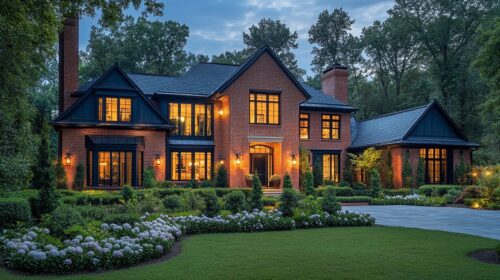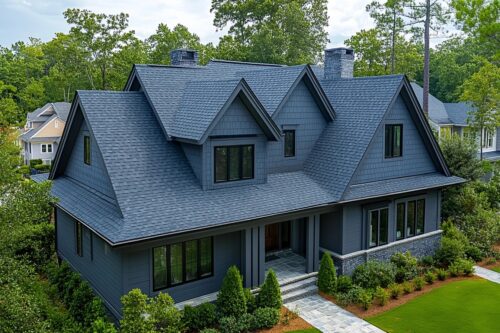 Three of the hottest markets in the U.S. for luxury homes are Raleigh, Nashville, and Austin. All of these areas are seeing increased growth and interest in the luxury home market. And, each area has its strengths and reasons for drawing people. Raleigh, however, is reaching new heights in the appeal of luxury neighborhoods with its proximity to the Research Triangle Park (RTP) economic engine that continues to be a benefit to the areas west of the I-440 Raleigh Beltline.
Three of the hottest markets in the U.S. for luxury homes are Raleigh, Nashville, and Austin. All of these areas are seeing increased growth and interest in the luxury home market. And, each area has its strengths and reasons for drawing people. Raleigh, however, is reaching new heights in the appeal of luxury neighborhoods with its proximity to the Research Triangle Park (RTP) economic engine that continues to be a benefit to the areas west of the I-440 Raleigh Beltline.
Being a major hub for technology, research, and development, RTP offers numerous job opportunities in various fields and brings thousands of people to the area. The luxury housing market in Raleigh, NC, is experiencing growth, driven by factors like tech industry expansion and increased demand from out-of-town buyers. While the overall Raleigh housing market is competitive, luxury homes, especially in specific areas, are seeing significant appreciation. Furthermore, Raleigh delivers a luxury lifestyle market at approximately 10 – 20% pricing discount to competing Sun-Belt peer cities.
The outlook shows that demand for Raleigh luxury real estate in 2025 is expected to stay high. Downtown Raleigh Alliance reported that the median $427-per-square-foot list price has risen 31% since 2020 in Downtown Raleigh, and new development sells out quickly.
Additionally, a luxury market report from Long & Foster Real Estate said that in July 2024, new $1 million home listings in the Durham-Raleigh-Chapel Hill triangle rose more than 44%, while sales at that price level increased 7% from a year earlier. Similarly, in July 2024, Zillow said that Raleigh’s median luxury price of $1.5 million was a 7% increase over July 2023.
Three facts have a bearing on the attractiveness of luxury homes in Raleigh as compared with Nashville and Austin:
According to Redfin, the Raleigh housing market trends for January and February 2025 saw home prices up 14.8% compared to last year, while the number of homes sold is down from last year. It is still a seller’s market in the Triangle but is becoming more of a buyer’s market than in previous years, according to CBS17.com. ABC WTVD reports that “more than 900 homes sold for over $1 million in the Triangle in 2023 to date.”
In April 2025, Doorify MLS in the Triangle region reported a total of 1,977 homes sold or pending. February 2025 closed with 7,590 homes listed across the greater Triangle area, 3,710 of which were new listings within the month.
The macro picture of all three luxury home markets in Raleigh, Nashville, and Austin indicates similar tailwinds. Hiring in the technology and life science industry, moving from other states, and interest rates are the three drivers in increased home sales.
North Carolina’s life sciences industry has experienced rapid growth, exceeding 100,000 jobs and increasing its employment base by 23% since 2019. The technology sector is experiencing strong growth in hiring, with a projected 20% spike in tech job openings by 2026. Large tech companies like IBM, Cisco, and Red Hat are established in the area, driving demand for tech talent.
Nashville, Tennessee, is experiencing strong technology hiring. Major companies like Oracle, Dell, Amazon, and Facebook are expanding to the area, creating thousands of new jobs. Nashville’s life sciences hiring run rate is strong. The city is demonstrating significant growth in research jobs and biological/biomedical science degrees. Between 2016 and 2021, Nashville added the most life sciences researchers among the top 25 U.S. markets, and research jobs grew by 77% in that timeframe.
Austin’s life sciences and biotech sectors have seen substantial growth, with employment expanding by nearly 74% between 2019 and 2023. Austin is a top-tier location for job growth in the life sciences sector, outperforming national averages. The city’s tech sector is experiencing strong growth, with a projected annual growth rate of 2.3%. Its tech sector is projected to grow annually by 2.3%, outpacing the national growth rate. Austin is a top destination for tech professionals, attracting talent from other major tech hubs like San Francisco.
Raleigh is experiencing significant growth, drawing people from other states due to a combination of factors, including strong job opportunities, a lower cost of living compared to major tech hubs, and a pleasant climate. States like California, New York, Virginia, Florida, and Texas are among the top sources of migrants moving to North Carolina. The cost of living index for Raleigh shows 105.8, which includes purchasing and renting homes.
Nashville is a popular destination for people moving from other states, particularly those from California, Florida, and other southeastern states. A robust job market, a lower cost of living, and Southern hospitality are all draws for people moving from other states.
Austin’s population growth is significantly fueled by interstate migration from California, New York, Washington, and Illinois. Austin’s robust job market, particularly in tech, and the lower cost of living compared to some other major cities, are factors contributing to the city’s appeal. Austin’s vibrant music scene, outdoor activities, and overall quality of life also attract new residents.
Across the board, in all three metropolitan areas, interest rates are favorable. Mortgage rates in 2025 are anticipated to only go down a bit because of an inflationary outlook. Jumbo quotes are back in the high 5% – low 6% range, which will boost luxury home sales this quarter.
Raleigh delivers an approximate $60 to $80 square foot discount to Austin and a 0.5 – 1.0 percentage-point tax advantage–even before accounting for lower homeowners insurance premiums.
To illustrate, the following table shows the Raleigh, Nashville, and Austin luxury home markets, including these metrics:
| Metric | Raleigh MSA | Nashville MSA | Austin MSA |
| Median sale price | $1.29 M (luxury tier) (Luxury Home Marketing) | $1.15 M (Green Hills) (The Luxury Playbook) | $1.40 M (metro) (Austin Neighborhoods) |
| Avg. $/sq ft | $427 (Downtown) (Barker Realty, Inc. |) | $450 + (Belle Meade) (The Luxury Playbook) | $488 (Austin Neighborhoods) |
| Median DOM | 45 days (Redfin) | 38 days (The Luxury Playbook) | 71 days (Austin Neighborhoods) |
| Effective property tax | 0.81 % Wake Co. (Tax Rates) | ~0.67 % Davidson Co. (state avg.) | 1.81 % Travis Co. (Tax Rates) |
| Cost-of-living index* | 100 (baseline) | 105 (+5 %) (The Luxury Playbook) | 114 (+14 %) |
*Composite utilities-housing-transport, source: LivingCost & BLS regional CPI.
Some aspects are unique to Raleigh that drive the growth of the area.
New Companies are Coming: Within the next 10 years, several companies are establishing major hubs in RTP. Apple has plans to construct a site by committing to a $550 million investment for a new campus and creating 3,000 jobs.
Fujifilm Diosynth Biotechnologies is building a new $1.2 billion, 1 million-square-foot manufacturing facility in Holly Springs, a town near RTP, that is expected to be the largest cell culture biopharmaceutical CDMO (Contract Development and Manufacturing Organization) facility in North America. The expansion will create 680 new jobs.
Eli Lilly is expanding its RTP facility in Durham with a $450 million investment. This expansion includes additional manufacturing capacity for their incretin products that treat diabetes and is expected to add at least 100 new jobs.
Walkable “Mini-Beltline” Lifestyle: Raleigh has several areas downtown including neighborhoods that offer a walkable, mini-beltline lifestyle, with good access to amenities without a car. While Raleigh doesn’t have a formal beltline like other cities, these walkable neighborhoods offer a similar experience of having access to amenities and services without relying heavily on a car.
These neighborhoods offer a mix of housing, shops, restaurants, and attractions that can be easily accessed on foot. A mix of dining, entertainment, and cultural attractions invite people into these areas such as downtown, Five Points, North Hills, Mordecai, and Oakwood in Raleigh and Fenton in Cary.
High Ranking Schools: Three of North Carolina’s top 10 public high schools are inside Wake County.
International Airport: Raleigh-Durham Airport (RDU) has 13 new nonstop routes (2023-25) vs. congestion-prone Austin (AUS) & Nashville (BNA). RDU is generally well-regarded, with people often praising its efficient operations, good customer service, and relatively manageable size. Many find it easy to navigate and appreciate the quick security lines and direct flight options.
 The Triangle MLS shows active $1 – 3 million listings up +26% year over year with <2.8 months of inventory, versus 4.1 months in Austin and 3.2 months in Nashville. (Trianglehousehunter.com, Austin Neighborhoods, The Luxury Playbook)
The Triangle MLS shows active $1 – 3 million listings up +26% year over year with <2.8 months of inventory, versus 4.1 months in Austin and 3.2 months in Nashville. (Trianglehousehunter.com, Austin Neighborhoods, The Luxury Playbook)
Inside the Beltline tear-down lots average $1.12 million for ~0.33 acre, creating a land value-to-sale price ratio near 40%, well below Austin’s 55%. This is important for future appreciation.
Five-Year Appreciation Scenario:
| Input | Raleigh | Nashville | Austin |
| Start price (2025) | $1.3 M | $1.3 M | $1.45 M |
| Expected 5-yr CAGR** | 4.2% | 3.6% | 2.8% |
| 2030 projected value | $1.59 M | $1.55 M | $1.67 M |
**CAGR (Compound Annual Growth Rate) is a financial metric that measures the average annual growth rate of an investment over a specific period, assuming that growth is compounded annually.
CAGR Assumptions: Historical FHFA (Federal Housing Finance Agency) metro House Price Index® blended with Moody’s Analytics forward curves; Raleigh premium is boosted 60 basis points (0.60%) for net-migration delta.
Raleigh’s combination of stronger job growth and lower starting basis lifts the net equity creation despite Austin’s higher nominal end-value.
Here are a couple of risk factors we want to address in being transparent:
As we move through 2025, Raleigh continues to solidify its position alongside Nashville and Austin as a leading destination for luxury homebuyers. With a strong foundation in tech and life sciences, a favorable cost of living, and unmatched livability in neighborhoods like North Hills, Five Points, and Cary’s Fenton district, the city offers both stability and upside. From a lifestyle and investment standpoint, Raleigh’s luxury market stands out not just for what it is today—but for what it’s becoming in the decade ahead.
Whether you’re relocating for work, upgrading your lifestyle, or investing in your future, McNeill Burbank builds custom homes in some of the Triangle’s most sought-after neighborhoods. With a legacy of craftsmanship and deep roots in the Raleigh-Durham area, we’re here to help you create a home that’s built to last, and built for you.
Call us at 919-439-1352 or complete the form below to start your custom home journey with McNeill Burbank.